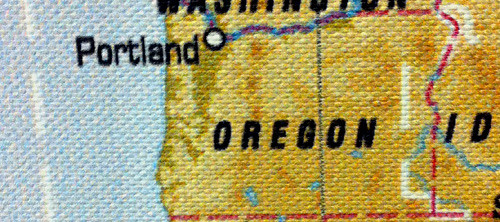 
rss feed | youtube | links | the burning log
Wednesday, August 08, 2007A review of Harry Potter and the Deathly Hallows
WATCH OUT! SPOILERS AHEAD!
I'm sure most fans of the Harry Potter series finished their copies of The Deathly Hallows within hours of buying them. I just made it to the last page over the weekend. I've seen all of the movies but I've only read two other Potter books, Sorcerer's Stone and Order of the Phoenix. I don't think this qualifies me as a fan and, to be honest, I'm pretty indifferent to the series at large. I bought a copy of The Deathly Hallows because of the hype and to be a part of a literary phenomenon the likes of which won't be seen for decades to come, if ever again. Plus, I was as curious as anybody to find out which characters J.K. Rowling was going to kill off. Speaking as an outsider, I'd give the book a mixed review. What has always bugged me about the series are the plots. Rowling is obviously a master when it comes to creating vivid fantasy worlds chock full of enough to details and character back stories to keep a million obsessive fans discussing them for a million years. But she takes her world and her characters and traps them in plotlines that aren't worthy of an early '80s computer game. When you get past the elaborate rules and decorum that fuel this wizarding society, the elaborate biographies and all the different kinds of novelties at the Weasley brothers' shop, this is a derivative hero's journey with an inevitable end that everyone could see coming from the outset. It's Luke Skywalker vs. Darth Vader all over again. It's the hobbits vs. the Eye of Sauron. What really separates this series from all the other sci-fi/fantasy tomes that have come before it? Harry Potter years 1 - 7 is, collectively, another tale about a collection of plucky heroes taking on yet another kill-crazy villain. Sure, throwing a criticism like "it's unoriginal!" at anything is unoriginal itself. Still, one of the major problems in the series is the lack of attention paid to its chief villain, Voldemort. Despite his complicated biography, he's as one-dimensional as it gets- yet another sneering, black-hearted antagonist bent on world domination that thinks nothing of killing off his underlings when he's feeling grumpy. There's nothing to the guy, he's pure evil, pure and simple- as stereotypical as a Saturday morning bad guy.  Much of The Deathly Hallows feels like it's going through the motions. After a rip-roaring start and an abrupt character death that has surely caused plenty of unpleasant bedtime story memories these past few weeks, the book settles into a dull slog as Potter and his friends aimlessly wander while in hiding. All sorts of interesting things are going down elsewhere. The wizarding world is falling to pieces. The Ministry of Magic is crumbling under the weight of a fascist plot and even Hogwarts is in lockdown under the watch of its new headmaster, Severus Snap. An underground network of heroes and students is doing what they can to undermine Voldemort's plans but Rowling isn't interested in them. For over 200 pages, she plunges her readers into unnecessary tedium. The Deathly Hallows is rife with unfulfilled potential but there's so many great moments to keep it from becoming an outright failure. At one point, Ron Weasly is confronted by the dark side of his own id when a magical horcrux unveils his worst nightmare- the chance that Harry and Hermione might secretly be getting it on behind his back. A major plot point centers around a legend concerning three unstoppable weapons that, over the centuries, have been written off as a mere children's story. A scene in a high-security bank almost leaves the protagonists drowning in a vault of treasure that endlessly reproduces itself. Another chapter leads them into the bowels of a Ministry of Magic overcome with corruption and Nazi-era politics. A gigantic melee during the finale leaves Hogwarts in ruins. As great as that bombastic battle is, The Deathly Hallows final 50 pages undermines the central theme of the series. One of things that has lifted Harry Potter's adventures above those found in other kid's books are its deep-rooted themes, chiefly the finality of death. When asked what the series is about, Rowling has responded with "death." She's ruthless when it comes to killing off characters and, aside from the occasional cameo by Potter's parents, characters stay dead. Then along comes a chapter at the end of The Deathly Hallows that washes all of that away. It's a frustrating cop-out and, had Rowling stuck by her guns rather than pandering to her audience, she would have ended the book a good thirty pages earlier than she does. Instead, we're treated to a lengthy sequence that makes Obi-Wan and Luke's "let's wrap up all the lose ends" chat at the beginning of Return of the Jedi look brilliant by comparison. The conclusion is obvious, pat and probably exactly what Rowling's fanbase was expecting and hoping for. There's not a surprise to be found at the end of The Deathly Hallows and, given the pathos and depth Rowling has given these books, it's a damn shame. Over seven installments the series became something more than mere children's stories. The author's fantasy world expanded and grew into something that could be respectfully enjoyed by readers of all ages. Then, when it comes to her big finale, she starts pulling punches. What should have ended with a bang, ends with a literal whimper and an all too happy sitcom ending. In the end, Rowling went the easy route and her series is much worse off for it. Simply put, (I'll put this last sentence in inviso-text to keep a massive spoiler hidden...) Harry Potter should have stayed dead. Labels: books

|
